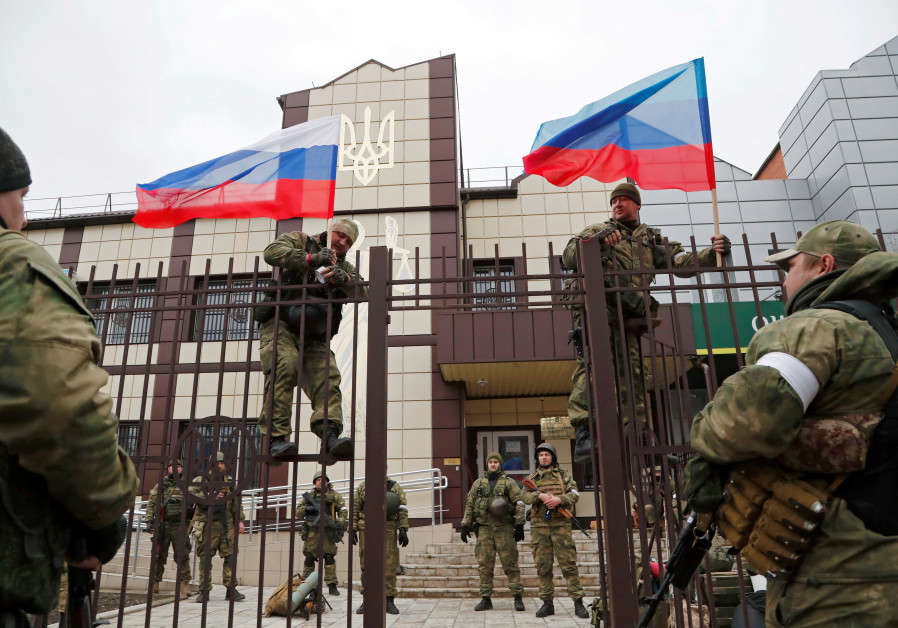Russia has begun to consolidate power in the areas of Ukraine under its control as its invasion of Ukraine continues, the Ukrainian Intelligence Directorate (GUR) claimed on Thursday.
This consolidation of power can be seen in two main forms, controlling the leadership of these areas by ensuring leadership positions are held by pro-Russian figures and detaining others, and by forcing legislation and referendums to legitimize their control over these areas.
Regarding the first point, a recent example reported by the GUR is Russia allegedly purging the leadership of the Luhansk People’s Republic (LPR), the pro-Russian separatist-run breakaway state in eastern Ukraine’s Donbas.
According to the GUR, Russia’s Federal Security Service (FSB) agents arrested LPR Interior Minister Oleksander Kornet and are currently detaining him in an FSB site in Rostov-on-Don.
However, the LPR is not happy with this, with LPR security and political officials opposing this move. According to the GUR, LPR’s leadership is working hard to free Kornet and reinstate him in his position.
As for why Russia is doing this, the GUR claims it is due to their casualties in the ongoing invasion of Ukraine.
As of Wednesday, Russia has lost 20,900 soldiers, 815 tanks, 391 artillery units, eight ships, 165 drones, 136 MLRSs, 2,087 armored vehicles, 150 helicopters, 171 aircraft, 67 air defense systems, 76 fuel trucks and 1,504 other vehicles, according to Ukraine’s Defense Minister Oleksii Reznikov.
With such damage done in a war that Russia refers to exclusively as a “special military operation,” the GUR alleges that Moscow is trying to use the “human resources” in Luhansk to quickly compensate and shore up their troops to continue the invasion.
In fact, on Monday, a European official said that up to 20,000 Wagner mercenaries and foreign fighters fighting on behalf of Moscow in Ukraine, though US intelligence could not confirm this.
These allegations of Russia detaining and arresting a member of LPR leadership is also not the only time Russia allegedly arrested a Ukrainian regional political figure.
Throughout the war, multiple accusations have been made stating that Russian forces arrested the mayors of cities and towns in eastern Ukraine, the most famous of which was Melitopol Mayor Ivan Fedorov.
Regarding the second point, recent reports have indicated that Russia plans on encouraging locals in parts of Ukraine under Russian control to vote on referendums that would, essentially, recognize these areas as independent breakaway states similar to the LPR.
So far, the most significant gains Russia has made in the ongoing invasion are in the Kherson Oblast. Now, Russia seeks to consolidate its hold there.
The GUR reported the presence of posters, booklets, flyers and ballots for a referendum for the residents of Kherson to vote on the oblast becoming an independent state.
A referendum is also allegedly being set up for Snihurivka, a Ukrainian city in the Mykolaiv Oblast under Russian control. This referendum, organized by pro-Russia politicians, will be related to electing the mayor and having the city fall under the administrative jurisdiction of Russian-occupied Crimea, according to the GUR.
How this referendum would work is unclear, but according to the GUR, residents are sure there won’t be any “real voting” as much as polling stations staffed with people to present an image for the Russian press.
On paper, it will seem like a vote actually occurred, however, as the GUR claim that Russia is fully aware of everyone in the region through personal data and passport information they had to give in order to receive food rations and humanitarian aid.
These referendums have precedence, as Russia did very much the same in 2014 for Crimea when it came to joining Russia. This referendum was widely panned and recognized as illegitimate by the international community, especially Ukraine.
In addition, the GUR also alleged that Russia will announce a proper Russian administration in some areas by September 1. This would see them open a Russian post office, introduce the ruble as currency, launch cellular and Internet services from Russian firms and even set up registering Russian passports.


